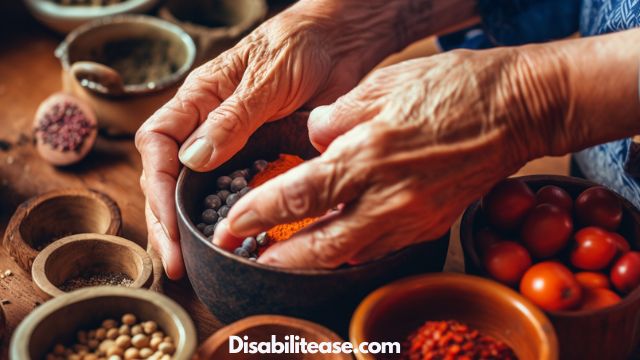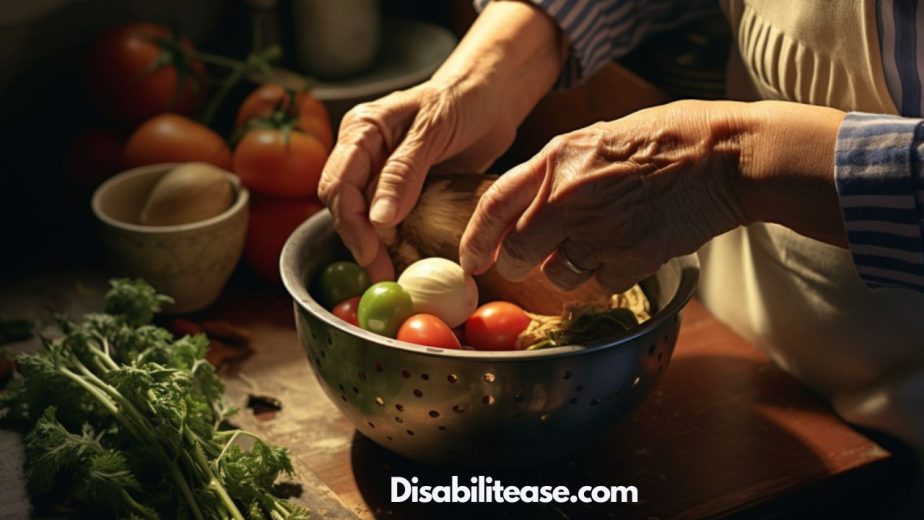Eating healthy is important for everyone, especially the elderly and disabled. When you’re aging or dealing with physical limitations, it can be difficult to keep up a good diet. But there are ways to make sure you’re getting the nutrition your body needs.

In this article, we’ll give you meal planning tips, nutritional guidelines, and even some food suggestions for specific health conditions.
With these tools in your back pocket, you can maintain a healthy diet regardless of your age or ability level.
So let’s get started!
Table of Contents
Meal Planning Tips
Meal planning is a great way to ensure that you’re getting all the nutrition you need, so make sure to plan ahead! Whether it’s pre-prepared meals for several days or portion control, meal planning can help elderly or disabled individuals maintain a healthy diet.
Pre-prepared meals can be easily stored and heated up when it’s time for lunch or dinner. Plus, if an individual has difficulty cooking due to physical limitations, pre-prepared meals are a great way to get in the daily recommended servings of fruits and vegetables without having to go through the hassle of making them from scratch.
Portion control is also important when maintaining a healthy diet. If there are specific dietary restrictions such as high cholesterol levels or diabetes, then controlling portions is key in order to stick within those limits. Measuring snacks and serving sizes will help with that goal. Additionally, prepackaged snacks are often easier than preparing items from scratch and still provide the necessary nutrients for good health.
The key takeaway here is that meal planning should become part of your routine! Having regular meal times along with pre-planned meals and proper portion control will give elderly or disabled individuals more energy throughout the day while ensuring they get all the necessary nutrition their body needs.
Nutritional Guidelines
Sticking to nutritional guidelines is essential for anyone wanting to stay fit and active. Elderly or disabled individuals should be especially cognizant of their dietary needs, as they likely require more vitamins and minerals than the average person. To ensure adequate nutrition, these individuals could follow some helpful tips for meal planning.
First and foremost, portion control is key when it comes to eating healthy. A balanced diet should consist of a variety of foods such as fruits, vegetables, whole grains, lean proteins, dairy products, nuts, and seeds. It’s important not to overindulge in any one type of food; instead, focus on including all necessary food groups in each meal. Additionally, serving sizes should be kept in mind so that meals are neither too large nor too small.
It can also be beneficial to take vitamin supplements if recommended by a doctor or dietician. Vitamins can help supplement any nutrient deficiencies that may occur due to age or disability-related restrictions on certain types of food consumption. Furthermore, it is always important to drink plenty of fluids throughout the day since dehydration can cause fatigue and other health issues amongst elderly or disabled individuals more easily than those who are able-bodied.
These tips along with regular exercise can help keep elderly or disabled individuals fit and healthy while providing them with the energy they need to carry out their daily activities without getting tired quickly. By adhering strictly to nutritional guidelines along with maintaining an active lifestyle through sports or physical activity like walking or biking for at least 30 minutes every day, elderly or disabled people will be able to maintain a high quality of life despite any physical limitations they may have encountered due to age or disability respectively.
| Food Groups | Examples | Nutritional Benefit |
|---|---|---|
| Fruits | Apples | Antioxidants |
| Vegetables | Broccoli | Fiber |
| Whole Grains | Brown Rice | B Vitamins |
| Lean Proteins | Turkey | Protein |
| Dairy Products | Milk | Calcium |
Foods for Specific Health Conditions

Eating right can be especially important for those with specific health conditions, as certain foods may help improve symptoms. For elderly and disabled individuals, a flexible diet is essential to ensure they receive the nutrition they need in an age-appropriate form. Depending on the individual, it may be beneficial to include vitamin supplements into their diet in order to maintain good health.
Generally speaking, eating a variety of fruits and vegetables is key, as well as consuming lean proteins and low-fat dairy products. High-fiber carbohydrates like whole grains are also beneficial. Avoiding processed foods or those high in sugar will also help elderly and disabled individuals maintain a healthy diet.
Good hydration is also important when considering nutrition for elderly or disabled individuals. Increasing water intake can help reduce inflammation and support cognitive function. Eating plenty of omega-3 fatty acids such as salmon or tuna can have a positive effect on heart health while adding garlic or ginger to meals can boost immunity levels due to their anti-inflammatory properties.
Other foods that should be included are legumes which provide protein and antioxidants, yogurt which offer probiotics for gut health, nuts which contain healthy fats and minerals like iron and magnesium, and dark green leafy vegetables that provide Iron B12 and more fiber than other veggies or fruits. All contribute positively towards overall well-being for seniors with disabilities too.
Elderly or disabled individuals should consult with their doctor before making any major dietary changes so that they can determine the best course of action based on individual medical needs. The doctor may suggest additional vitamins or supplements if necessary in order to achieve optimal nutrition levels needed for good health at this stage of life.
With careful planning and monitoring of daily intake, it’s possible for these individuals to eat nutritiously despite physical limitations – helping them stay active longer by providing them with proper nourishment!
Conclusion
You can maintain a healthy diet and nutrition as an elderly or disabled individual. Meal planning, following nutritional guidelines, and eating foods for specific health conditions are key. By making smart dietary choices, you can stay healthy and nourished.
With a little extra effort, you can enjoy the benefits of healthy eating habits that will last for years to come. Don’t forget to talk with your doctor about any dietary restrictions or nutritional needs you may have.
With some changes to your routine and dedication to quality nutrition, you’ll be well on your way to living a healthier lifestyle!

Hi, my name is Eddie, I am a professional trainer specializing in the elderly population and I’m also a website designer. I love training in the gym, going to the beach, traveling, and having good food.
I combined my love for sport and website designing to make “DisabilitEase” whose purpose is to help elderly and disabled people live a more full and active life, have more fun, and enjoy their unique journey despite any disability.



